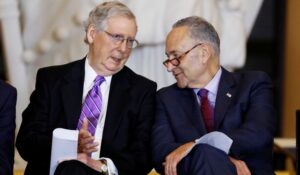
The National Interest Foundation Newsletter
Issue 42, April 23, 2020
Welcome to our NIF Newsletter. In this week’s headlines: President Trump announces his plan to temporarily suspend immigration for a 60-day period, the U.S. Senate approves a new round of coronavirus aid, oil prices plunge to a historic low, and a unity government deal is agreed upon in Israel.
Suspension of Immigration

President Trump has suspended immigration into the United States for 60 days. (Photo from AFP)
President Trump Suspends Immigration for 60 Days
President Trump announced on Tuesday that he would be temporarily stopping immigration into the United States for a 60-day period as his administration grapples with the effects of the coronavirus. The move bars green card recipients from moving to the United States, but will still allow temporary workers on non-immigrant visas to enter. During a news briefing, the president said he was issuing this order to protect out-of-work Americans who have lost their jobs due to shutdowns forced by COVID-19. He said that unemployed Americans should be first in line to regain jobs when the economy reopens, and that it “would be wrong” to replace them with immigrant labor from abroad. After the 60-day period ends, President Trump said the order would be modified “based on economic conditions” that he would personally and unilaterally assess.
New Round of Coronavirus Aid

The U.S. Senate approved a new round of coronavirus aid for small businesses and hospitals. (Photo from Reuters)
Senate Approves $484 Billion Coronavirus Relief Package
The U.S. Senate approved a new round of coronavirus relief, worth around $484 billion, aimed at providing money for small businesses and aid for hospitals and disease testing. A large segment of the bill’s funds – around $384 billion – will go towards replenishing the Paycheck Protection Program, the small-business payroll loan program that ran out of money last week. An additional $75 billion will be given to hospitals, and the remaining $25 billion will be used to boost coronavirus testing. Senator Mike Lee (R-UT) and Senator Rand Paul (R-KY) initially voiced opposition but allowed the bill to go through without formally objecting, and the legislation was passed with unanimous consent on Tuesday afternoon. The U.S. House of Representatives is expected to take up and pass the bill on Thursday, and President Trump has already expressed that he plans on signing it into law after that.
Oil Price Plunge

Oil prices in the United States plummeted to a historic low this week amid COVID-19 lockdowns. (Photo from Getty Images)
Massive Collapse of Oil Prices
For the first time in history, oil prices in the United States hit negative values this week. Demand for oil has evaporated as countries continue to be locked down in the face of the spread of COVID-19. As a result, oil suppliers are stuck with significant excess, and fears are growing that storage space will run out in May. Last week, OPEC+ agreed to a historic deal in which the conglomerate agreed to cut global supply by 10%. However, closer analysis shows this will not have an impact large enough to balance oil markets. The price of oil plummeted this week on a technicality, given that oil is traded on its future price, and contracts for May expired on Tuesday. With this deadline looming, traders dumped their holdings to ensure they avoided the headache of taking delivery of the oil and finding storage for it. Experts have warned that an uptick in prices for June was unlikely as well given the current trajectory of COVID-19.
Unity Government Deal in Israel

Netanyahu and Gantz signed an agreement to form a unity government. (Photo from Getty Images)
Netanyahu and Gantz Agree to Form Unity Government
Israeli Prime Minister Benjamin Netanyahu and rival Benny Gantz signed an agreement earlier this week to form a unity government. The deal comes after a year-long political stalemate caused by three inconclusive elections since April of 2019. Under the terms of the agreement, Netanyahu will remain prime minister for 18 months before handing the position over to Gantz. Netanyahu has been criminally-indicted on multiple charges of bribery, fraud, and breach of trust, and is therefore set to face trial while still serving in his post. His trial was originally scheduled to begin last month in March, but has been delayed due to the ongoing coronavirus pandemic. Gantz had long-pledged not to serve alongside Netanyahu due to the impending criminal charges against him, but backtracked recently and began negotiations with the incumbent prime minister.
